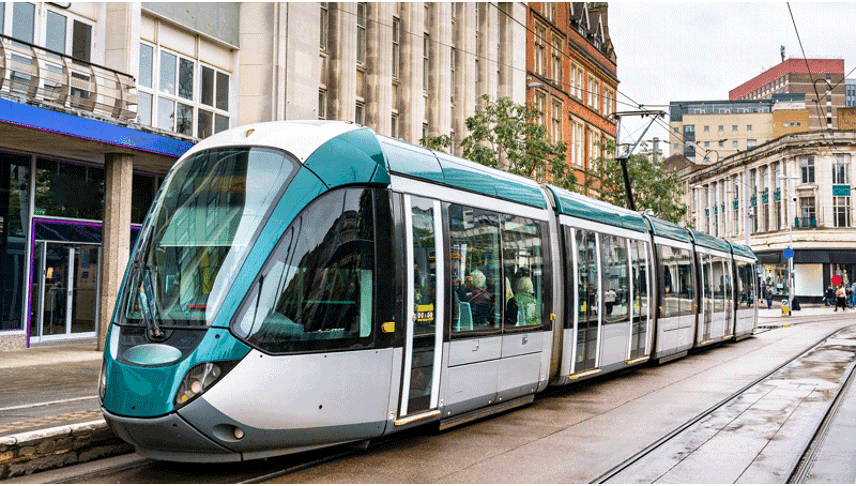Register for free and continue reading
Join our growing army of changemakers and get unlimited access to our premium content

Nottingham's tram system (pictured) is partly funded by a levy on workplace parking, used as a case study in the report
That is the warning made by MPs on the All-Party Parliamentary Group on a Green New Deal, which has this week published a new report assessing how local action can help to accelerate emissions reductions in key sectors including buildings, energy, transport and food.
The report draws on the Climate Change Committee’s (CCC) most recent annual progress report to Parliament, which concluded that rates of decarbonisation in virtually every sector have not been sufficient to date for the nation to meet its upcoming carbon budgets. The CCC rapped Ministers for “major failures in delivery programmes” relating to buildings, heat and agriculture in particular.
A key focus of the APPG’s new report is how better support for local authorities, businesses and communities can put the UK on track to meet its climate targets while also maximising the social and economic opportunities of the net-zero transition – and ensuring these opportunities are shared across the nation. This was the aim of the recent Net-Zero Review spearheaded by Chris Skidmore MP. Moreover, the Government has previously been warned that more local support and engagement is needed on its net-zero journey by the Public Accounts Committee.
Mayors, academics, business leaders and energy experts all contributed to the APPG’s evidence sessions, used to create the report. Recommendations detailed in its pages include:
- Mortgage penalties for landlords who let energy-inefficient homes (1% levy for properties of EPC ‘C’ or lower)
- Enhanced support for community renewable energy schemes
- More effective community decision-making processes on Nationally Significant Infrastructure Projects including energy generation
- An end to all fossil fuel subsidies
- An expansion of schemes incentivising homeowners to use energy at off-peak times
- The replacement of fertiliser and fuel subsidies for farmers with schemes that support regenerative farming
- The creation of a new Local Food Investment Fund to support farmers in adopting more sustainable practices
- A mandate for certain new buildings to have solar or natural roofs
- 50% off business rates for food outlets sourcing at least half of their produce within a 50-mile radius
- More affordable public transport, potentially funded in part by new levies on workplace parking
- Ofgem opening its Innovation Funding to more local heating schemes
As well as these and other changes in regulation and legislation, the APPG is calling for increased finance to ensure that local areas can “reach the full potential” of their climate schemes – in emissions reductions terms but also in terms of positive socio-economic impact. It emphasises how top-line targets in sectors including transport and buildings will only be met with action regionally and locally. It also emphasises how, if implemented together, the measures proposed would contribute to solving the cost-of-living crisis and help rebuild public trust in policymaking.
Decarbonisation obligation
Another key facet of the report is its calls for stricter climate obligations on local authorities plus increased powers to meet them.
Under the Paris Agreement on climate, the UK is committed to reducing its absolute annual carbon emissions by 68% by 2030, against a 2019 baseline. The APPG is recommending that this target is made a binding obligation for all public sector organisations and agencies, covering spending and future projects as well as operations.
Also recommended is a statutory duty for councils to reduce emissions at this rate. To deliver upon this duty, the APPG has concluded, the task of delivering integrated public transport services must be returned to local authorities.
Transport has been the UK’s highest-emitting sector since 2016, when it overtook power generation. A drop in emissions occurred during lockdowns in 2020 and 2021 but transport emissions are expected to have rebounded now.
Labour MP Clive Lewis co-chairs the APPG with Green Party MP Caroline Lucas. Lewis said: “The greenest shoots of the economic transition demanded by the climate emergency are found in the transformatory and locally-led initiatives we see up and down the UK.
“This local leadership should be taken as a national cause for hope, offering a roadmap for how to implement a Green New Deal and meet 2030 climate targets in a way that empowers local communities and embraces a diversity of approaches. Central Government needs to step up and let local people lead, by equitably distributing resources and decentralising decision-making power.”
The UK Government is set to publish an update to its flagship Net-Zero Strategy by the end of March as the initial strategy was ruled ‘unlawful’ in the High Court last year. This update could be a chance to implement some of the policies proposed by the APPG.


Needs brave leadership from HMG especially in transport